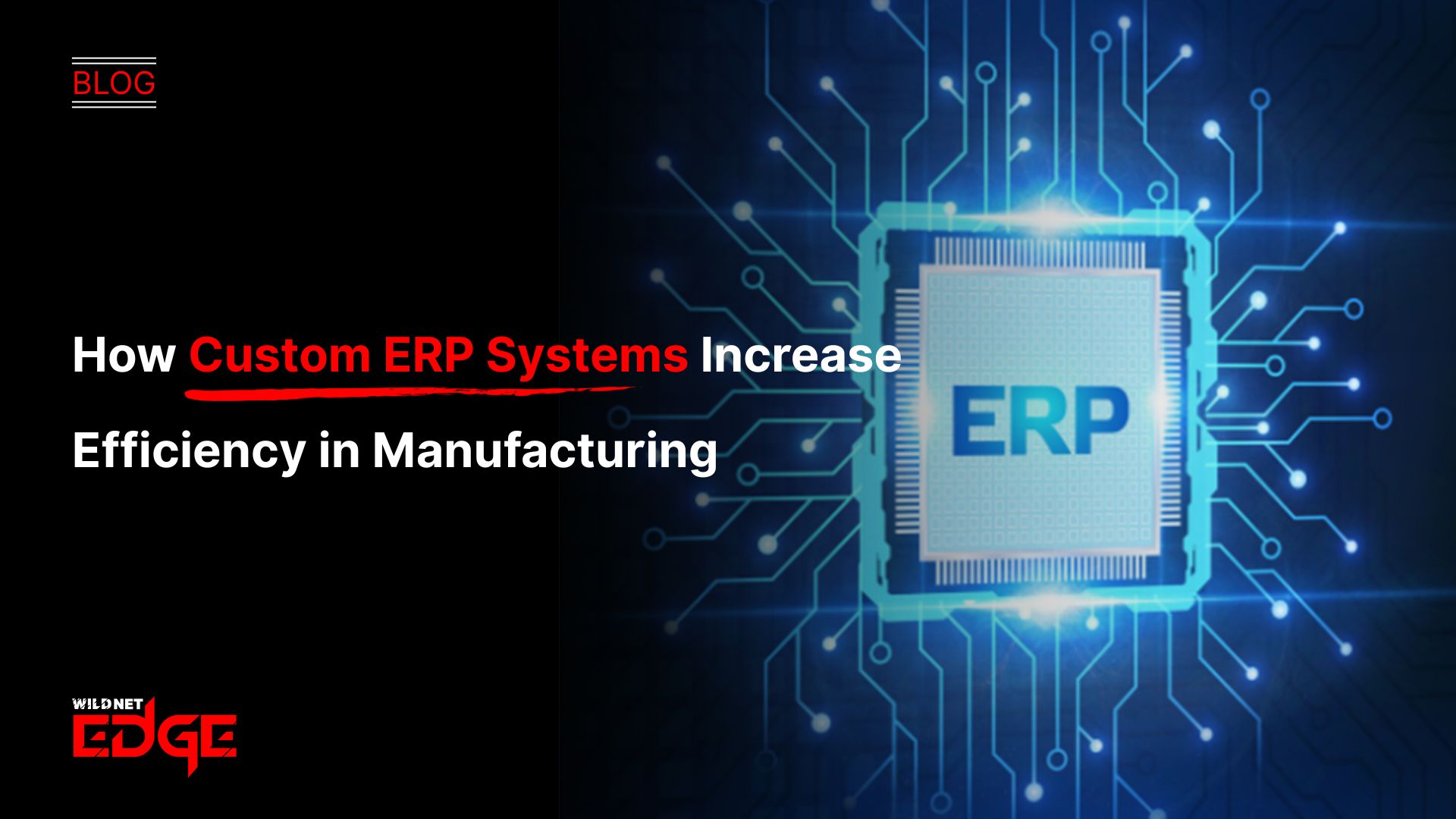Struggling to keep up with the chaos of manufacturing operations? You’re not alone. Off-the-shelf software often misses the mark on your unique challenges, leading to wasted time and resources. That’s where a custom ERP system steps in — designed specifically for your needs, it streamlines workflows, improves production tracking, and ultimately boosts efficiency. In this post, we’ll show you how custom ERP solutions transform manufacturing for the better, delivering measurable improvements across your operations.
Understanding Manufacturing Software Solutions
Manufacturing software solutions encompass a broad range of tools and platforms designed to automate, manage, and optimize factory operations. Central to these solutions are Enterprise Resource Planning (ERP) systems, which coordinate business processes like inventory, procurement, finance, and production.
Why Customization Matters in ERP for Manufacturing
Standard ERP packages offer generalized modules that may not perfectly align with the complexity of your manufacturing environment. Generic software often lacks the flexibility needed to address unique workflow nuances, regulatory requirements, or integration demands with specialized machinery.
A custom ERP solution tailors:
- Data inputs and processing flows
- Production scheduling and resource allocation
- Reporting dashboards specific to your KPIs
- Integration with proprietary hardware and IoT devices
This tailored approach ensures your ERP system isn’t just “good enough” but optimized for your exact operational context.
Key Features Manufacturers Need in ERP Systems
- Production Planning & Scheduling – Handling custom workflows and batch production cycles precisely.
- Robust Inventory Management – Tracking raw material usage, reorder levels, and warehouse movements in real time.
- Quality Control Modules – Embedded QC checks and compliance tracking to maintain manufacturing standards.
- Costing and Financial Integration – Accurate cost tracking linked to production activities for profitability analysis.
- Real-Time Data Capture & Analytics – For fast decision-making and dynamic process adjustments.
By focusing on these features through customization, manufacturers can overcome the limitations of off-the-shelf solutions and achieve higher returns on software investments.
Enhancing Production Tracking with Custom ERP
Production tracking is the backbone of efficient manufacturing — it ensures every stage of the process is monitored, minimizing downtime and defects.
Benefits of Integrated Production Tracking
Customized ERP systems integrate production tracking directly with key operational data, delivering benefits such as:
- Reduced Errors: Automated data capture eliminates manual entry mistakes for things like batch numbers, cycle times, and machine outputs.
- Traceability: Every component and process step is logged, enabling seamless recall management and accountability.
- Improved Schedule Adherence: Real-time updates on production progress allow proactive adjustment to avoid delays.
Examples of Production Tracking Improvements via Custom ERP
- A manufacturer of automotive parts integrated their ERP with shop floor sensors to track machine uptime and detect early faults. This reduced unplanned downtime by 20% in under six months.
- A food processing company used a custom ERP to link batch production tracking with quality control data, enabling rapid identification of contamination sources and satisfying stringent FDA audit requirements.
Real-Time Monitoring and Data Analytics for Better Decision-Making
Modern custom ERP systems harness IoT devices and advanced analytics to provide granular visibility across production lines. Features include:
- Live dashboards: Monitor throughput, bottlenecks, and resource utilization in seconds.
- Predictive analytics: Forecast maintenance needs and optimize machine scheduling to maximize output.
- Mobile access: Empower plant supervisors with remote oversight tools to react faster to issues.
The enhanced visibility from custom ERP-backed production tracking creates a data-driven culture, where decisions are based on up-to-the-minute facts rather than assumptions.
Driving Efficiency through Workflow Automation
Efficiency in manufacturing hinges on minimizing manual effort and synchronizing complex supply chain processes. Custom ERP systems excel by automating these workflows.
Automation of Manual Processes
Custom ERP can automate numerous repetitive tasks such as:
- Generating purchase orders based on inventory thresholds
- Scheduling machine maintenance alerts
- Consolidating labor time capture and shift reporting
- Automatically routing quality inspection results for approval
The elimination of manual handoffs reduces human error and frees employees to focus on higher-value activities.
Supply Chain and Inventory Management Enhancements
A tailored ERP solution can:
- Dynamically adjust procurement quantities based on real-time demand and lead times
- Integrate with suppliers’ systems for faster restocking
- Provide just-in-time inventory alerts to reduce holding costs without risking stockouts
Customizing these features ensures the supply chain adapts fluidly, avoiding costly production disruptions.
Impact on Operational Efficiency and Cost Reduction
Automation enabled by custom ERP delivers measurable results, including:
- Up to 30% reduction in inventory carrying costs through optimized stock control
- Decrease in order processing times by automating approvals and documentation
- Enhanced labor productivity by streamlining shop floor data collection
These efficiencies cumulatively improve overall throughput, reduce waste, and enhance profit margins — critical for staying competitive in 2025’s manufacturing landscape.
Future Trends in Manufacturing ERP Systems
As manufacturing evolves, custom ERP systems must incorporate emerging technologies to maintain their edge.
AI and Machine Learning Integration
Artificial Intelligence within custom ERP:
- Predicts production bottlenecks before they occur
- Suggests optimized scheduling based on historical data
- Enhances quality control by identifying irregular patterns or defects
Machine learning algorithms continuously refine these models, improving accuracy over time.
IoT-Enabled Production Tracking
Internet of Things (IoT) integration empowers ERPs to:
- Collect granular data from machines and sensors across factories
- Trigger automated workflows based on real-time conditions (e.g., a machine overheating initiates an immediate maintenance ticket)
- Support remote monitoring and control via connected mobile apps
This connectivity deepens insight into equipment health and production flow.
Cloud-Based ERP Benefits for Remote Access and Scalability
Cloud ERP systems provide:
- Global accessibility for distributed manufacturing sites or remote teams
- On-demand scalability to grow with your business
- Reduced IT overhead since updates and maintenance are managed by providers
The future manufacturing ERP increasingly moves toward secure, cloud-native deployments that enhance agility and reduce costs.
Conclusion
Custom ERP systems are game-changers in manufacturing, offering tailored software solutions that streamline production tracking and boost overall efficiency. Unlike rigid off-the-shelf software, custom ERP adapts precisely to your unique workflows, automating manual tasks and providing real-time insights that drive smarter decisions.
For manufacturers looking to optimize operations and maintain a competitive edge in 2025 and beyond, partnering with a trusted provider like WildnetEdge ensures you get a solution designed specifically for your challenges and goals. With deep expertise in manufacturing software solutions, WildnetEdge delivers ERP systems that turn complexity into clarity and inefficiency into profit. Ready to transform your manufacturing efficiency? Explore custom ERP with WildnetEdge today.
FAQs
Q1: What are the benefits of using custom ERP for manufacturing?
Custom ERP systems provide tailored workflows, enhanced production tracking, and better integration with existing processes. This leads to improved efficiency, reduced errors, and significant cost savings.
Q2: How does custom ERP improve production tracking?
Custom ERP offers real-time data visibility by integrating IoT and sensor data. It automates tracking processes, minimizes manual input errors, and provides live insights that help avoid production delays and bottlenecks.
Q3: Can manufacturing software solutions integrate with existing systems?
Absolutely. Custom ERP can be designed to seamlessly integrate with legacy software, specialized machinery, and other business applications to create a unified, streamlined workflow.
Q4: What trends are shaping the future of ERP in manufacturing?
Key trends include AI-driven analytics for predictive maintenance and quality control, IoT-enabled production tracking for granular data capture, and cloud-based ERP platforms that offer scalability and remote accessibility.
Q5: Why choose WildnetEdge for custom ERP development?
WildnetEdge specializes in building personalized ERP systems grounded in deep manufacturing industry knowledge. Their solutions are crafted to meet precise operational needs, enabling manufacturers to elevate efficiency and competitiveness.

Nitin Agarwal is a veteran in custom software development. He is fascinated by how software can turn ideas into real-world solutions. With extensive experience designing scalable and efficient systems, he focuses on creating software that delivers tangible results. Nitin enjoys exploring emerging technologies, taking on challenging projects, and mentoring teams to bring ideas to life. He believes that good software is not just about code; it’s about understanding problems and creating value for users. For him, great software combines thoughtful design, clever engineering, and a clear understanding of the problems it’s meant to solve.
 sales@wildnetedge.com
sales@wildnetedge.com +1 (212) 901 8616
+1 (212) 901 8616 +1 (437) 225-7733
+1 (437) 225-7733















 ChatGPT Development & Enablement
ChatGPT Development & Enablement Hire AI & ChatGPT Experts
Hire AI & ChatGPT Experts ChatGPT Apps by Industry
ChatGPT Apps by Industry ChatGPT Blog
ChatGPT Blog ChatGPT Case study
ChatGPT Case study AI Development Services
AI Development Services Industry AI Solutions
Industry AI Solutions AI Consulting & Research
AI Consulting & Research Automation & Intelligence
Automation & Intelligence















